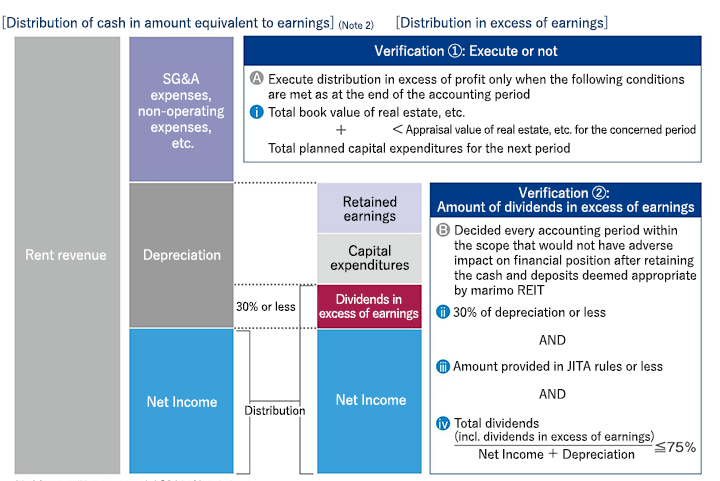Financial Strategy
Financial Policy
marimo REIT shall pursue building of a stable asset management base, efficiency of asset management and soundness of financial standing over the medium to long term.
| Equity strategy | Issuance of new investment units shall be decided in light of the financial environment in due consideration of the dilution of unitholdings due to the issuance of new investment units, comprehensively taking into account various factors, such as the profitability and timing of acquisition of the assets under management to be acquired at the same time, level of LTV ratio (ratio arrived at when total balance of borrowings and investment corporation bonds outstanding is divided by total assets; the same shall apply hereinafter) and repayment plan for interest-bearing liabilities. |
|---|---|
| Debt strategy | Staggering of maturities, lengthening of borrowing periods and lowering of borrowing interest rates shall be aimed. In terms of debt financing, fund procurement shall be in due consideration of the balance between fund procurement agility and financial stability. Efforts shall be made for stable and sound financial management based on relationships with city banks and regional financial institutions in various regions. |
| Level of LTV ratio | The conditions for LTV ratio shall be to manage with 60% as the upper limit as a rule, but the operational target shall be a 45% to 55% range. |
Distribution of Cash in Excess of Earnings (Refund of Investments in Capital)
marimo REIT executes distribution of cash in excess of earnings (hereinafter, “distribution in excess of earnings”) only when total appraisal value of real estate, etc. held as at the end of the accounting period exceeds total book value of real estate, etc. for the concerned accounting period plus total planned capital expenditures for the concerned accounting period’s next period; provided, however, that there may be cases where the distribution in excess of earnings may not take place in light of various factors, such as the economic environment, real estate market conditions and financial status of marimo REIT (Articles of Incorporation Article 25, Paragraph 2, Item 2). In the event that the distribution in excess of earnings is to be executed, the amount shall be decided every accounting period by marimo REIT in an amount that is not to exceed the amount provided in the rules of The Investment Trusts Association, Japan (hereinafter, “JITA”) and also no more than the amount equivalent to 30% of depreciation (Articles of Incorporation Article 25, Paragraph 2, Item 2), but within the scope that would not have adverse impact on financial position after retaining the cash and deposits deemed appropriate by marimo REIT in light of the status of establishment of lines of credit, etc. so as not to impact plans for repair expenses and capital expenditures and also so as to respond to demand for funds (such as capital expenditures and other funds required for new acquisition of assets or to maintain/enhance portfolio assets, marimo REIT’s working capital, repayment of obligations, and payment of dividends), while also considering other options, such as utilization for repair expenses and capital expenditures and allocation to funds for repayment of borrowings or acquisition of new properties (Note 1).

| (Note 1) | JITA rules specify that closed-end investment corporations may execute distribution in excess of earnings no more than the amount equivalent to 60% of depreciation posted as of the last day of the accounting period. |
|---|---|
| (Note 2) | The above is a conceptual image only and not intended to indicate the ratio of distribution in excess of earnings to net assets, etc. The actual amount of distribution in excess of earnings may vary, or the distribution in excess of earnings may not even take place, due to various factors, such as the economic environment, real estate market trends, status of portfolio assets and financial status. |
- Related Links
- Borrowings
- Bonds
- Interest-Bearing Liabilities